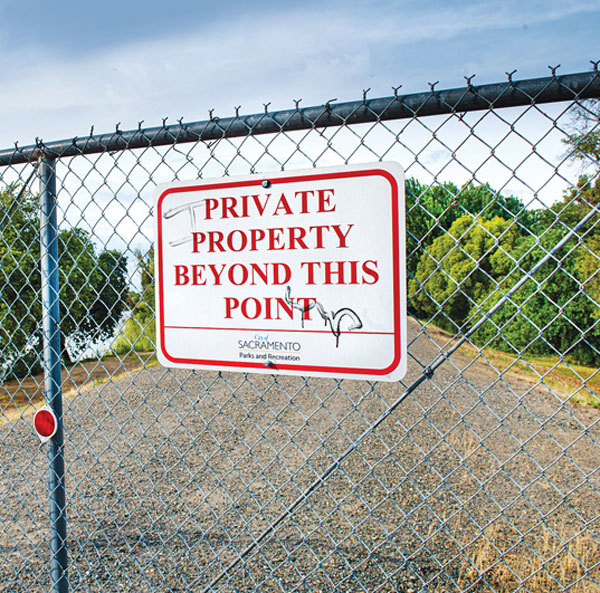Four decades ago, when property owners along the Sacramento River levee realized they could build fences to keep the public away, they had two big weapons.
First was political influence. They had friends at City Hall. Those friends wouldn’t squawk about fences and gates that blocked public access to Sacramento’s greatest natural resource.
And they had secrecy. They could quietly seek permits from the state flood board to build fences and gates across the levee. There were no town halls or public hearings where residents could object to fence permits.

Property owners eventually learned something else. Once they built fences, there was minimal enforcement by authorities to ensure the barricades confirmed to permits. Details about height, length, materials and location were conveniently forgotten.
Fence permits were passed along when a property owner died or moved away. Never mind that levee encroachment permits had no transfer rights.
It drives property owners nuts when I say every fence along the levee is illegal, but it’s true. Here’s why—none confirm to permits issued decades ago.
Now that the Army Corps of Engineers is removing fences and gates for the Big Fix levee repair project, encroachment permits have been revoked. The state flood board has made it clear permits won’t be issued for replacement fences or gates.
The state hasn’t issued any levee fence permits for at least 25 years. A formal no-fence policy was established in 2020.
Unfortunately, some property owners didn’t get the message. They continue to agitate for new fence permits once levee slurry walls are built and the levee project is completed.
Every month, I get emails from readers warning about Zoom strategy sessions by residents along the river lobbying for new fences. I’m thrilled to receive these notices. They demonstrate public vigilance.
No longer will people in Pocket, Greenhaven and Little Pocket sit back and sheepishly let a few property owners near the levee turn the calendar back on public access.
What this means is no more secret permits, no more political sleight of hand, no cozy relations with City Hall or state officials to block the public’s right to access the levee and river.
Here’s a good place to describe the relationship between the city and state when it comes to public access along the river. The state owns the levees. A state agency, the Central Valley Flood Protection Board, is responsible for keeping them safe and clear of encroachments.
The flood board is not concerned about recreational opportunities along the levee and river—although for decades it allowed residents near the levee to create their own recreational playpens behind the gates.
Today the flood board cares only about the maintenance and safety of the levees. Those are reasons the board gives when it rejects requests for a new fence, citing “limitations on the ability to access the levee for maintenance, inspection and flood fight procedures,” board staff says.
Meanwhile, the city cares a lot about recreation. That’s why city officials promised to build the Sacramento River Parkway in 1975. It’s why the City Council finally got around to funding the engineering and material for a bike trail atop the levee.
The state supports the bike path. A paved trail will ease levee maintenance and inspection. But the state doesn’t want to deal with loudmouth households near the levee complaining about cyclists and pedestrians peeking in their windows.
So the city and state have an understanding. The city will handle the bike trail and NIMBY residents. As levee landlord, the state will remove encroachments—illegal fences, gates and stairways—and support a paved bike path.
Levee repairs should be finished in 2024. The city plans to pave the levee in Pocket immediately after. City Hall anticipates litigation, which has me worried only because the legal work would presumably fall to City Attorney Susana Alcala Wood.
After her dismal performance on reapportionment, Wood is respectfully hereby requested to hire a law firm that understands eminent domain and the state’s fee simple levee ownership. I can’t say it any more nicely.
R.E. Graswich can be reached at regraswich@icloud.com. Follow us on Facebook, Twitter and Instagram: @insidesacramento.
















